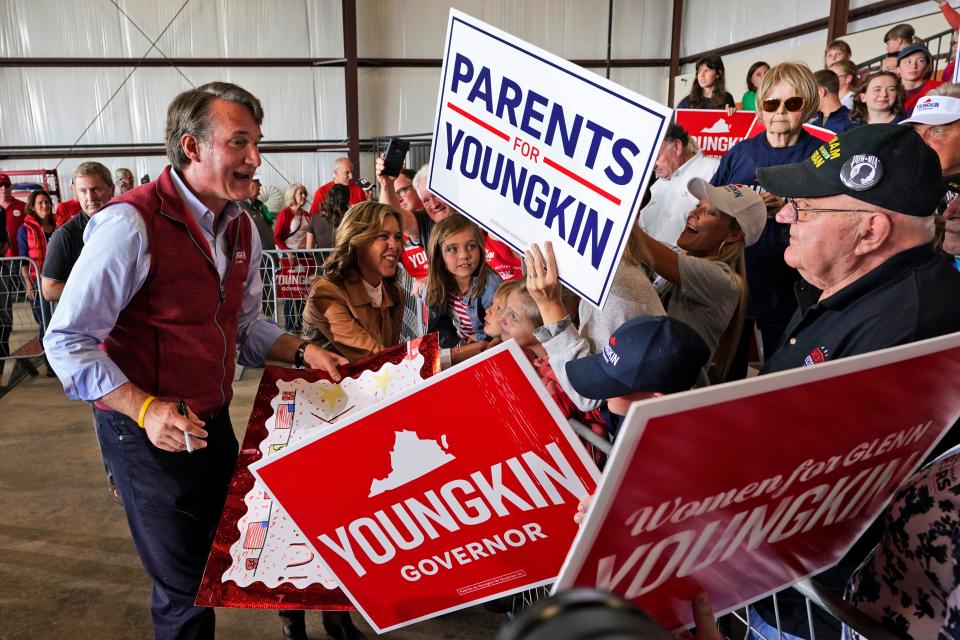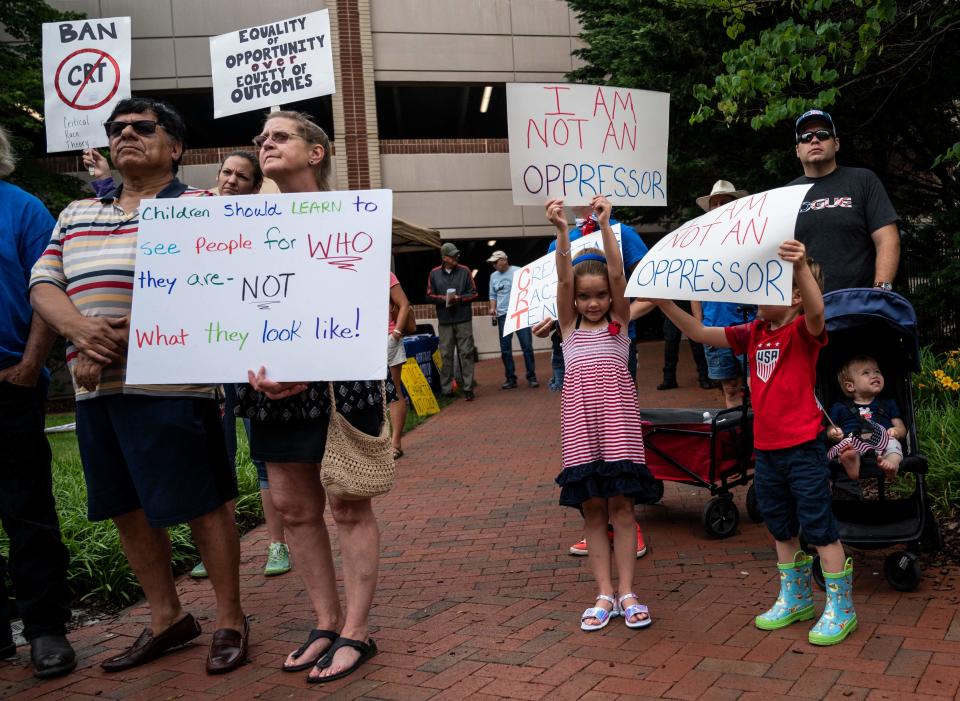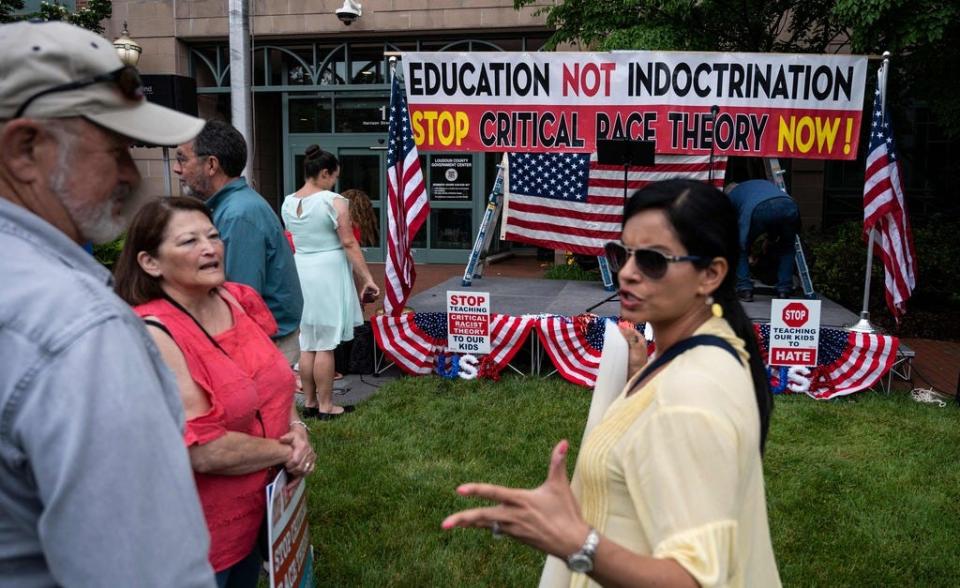How critical race theory went from conservative battle cry to mainstream powder keg
- Oops!Something went wrong.Please try again later.
Two years ago, the term critical race theory was largely unknown outside academia. This month, it helped determine an election.
In Glenn Youngkin's triumph in the Virginia governor race, the GOP beat Democrats at taking a decades-old framework about systemic racism and defining it for their base. Across the country, dozens of conservative candidates were elected to school boards riding a wave of sentiment against critical race theory.
Those victories followed a surge of the term on cable news, stump speeches and even legislation. Critical race theory or "CRT" became a household phrase, absorbed into the American political bloodstream.
But it didn't start there.
Critical race theory as a conservative talking point went through several iterations before appearing in the context of children's education, part of a laser-focused, multiyear effort by a constellation of conservative activists, media personalities and strategists, a USA TODAY analysis shows.
With each cycle, the phrase increasingly pervaded mainstream media, first as a critique of "woke" culture, then regarding racial sensitivity training and finally, most potently, in the context of K-12 school curricula.
Though Fox News eclipsed other networks on volume of critical race theory coverage, MSNBC and CNN consistently followed Fox, bringing critical race theory further into the mainstream and exposing it to vast audiences, according to a database of transcripts hosted at Stanford University. The same pattern is visible among conservative and mainstream news articles according to Media Cloud, a project hosted by the University of Massachusetts at Amherst, Northeastern University and Harvard University.
Black Lives Matter backlash
Conservative warnings about critical race theory emerged as part of the fervent backlash to The New York Times' 1619 Project – published in August 2019 – that reframed the founding of America around slavery.
Use of the phrase picked up steam in late 2019 and early 2020 on fringe conservative blogs and right-wing publications such as The American Conservative and Daily Signal and in the talking points of staunchly conservative think tank the Heritage Foundation.
Mitch McConnell: 1619 not an important point in U.S. history
Arguments framed critical race theory as part of the broader criticism against "woke" culture, which conservative opponents cited as stifling intellectual discourse.
The killing of George Floyd reenergized the Black Lives Matter movement in the summer of 2020, and the phrase further entrenched itself in conservative arguments about the dangers of left-wing social justice movements as millions took to the streets demanding major reforms or total dismantlement of law enforcement agencies.
The rise of Christopher Rufo
In July 2020, critical race theory surged in conservative media in large part because of Christopher Rufo, a fellow with the right-leaning Manhattan Institute, who published a story claiming Seattle municipal employees were indoctrinated by a radical new orthodoxy underpinned by critical race theory in racial sensitivity training materials.
Outlets such as the Washington Examiner and New York Post published his work, and a week later, Rufo appeared on Laura Ingraham's Fox News program – which attracts 2.3 million viewers – on July 16. Thus began Rufo's massive reach into the mainstream.
Rush Limbaugh cited Rufo's work the next day on conservative talk radio (15 million listeners). On July 27, Rufo went on conservative host Glenn Beck's show (10 million listeners).
On Aug. 12, Rufo appeared on Tucker Carlson's Fox News show (2.8 million viewers), saying critical race theory had "spread like wildfire" from the "smallest local school districts in Tennessee or Kansas to the highest levels of the federal government."
On Sept. 2, he was invited back on Carlson's show, where he called on then-President Donald Trump to issue an executive order prohibiting racial sensitivity training for federal employees. According to The New Yorker magazine, Rufo received a call the next morning from the White House asking him to advise the effort.
Two days later, the Trump administration issued a memo telling federal agencies to end trainings on critical race theory. Later that month, Trump signed an executive order extending the ban.
The Heritage Foundation, one of the most influential conservative organizations in the country, issued a lengthy report in December 2020 condemning critical race theory as a "new intolerance" rooted in Marxist ideology. It included five policy recommendations. Three were about education.
By early 2021, critical race theory was no longer an issue about a new policy implemented in federal agencies and local governments. Conservative outlets sharpened the argument, citing the Heritage Foundation report and arguing CRT was coming to K-12 classrooms.
Critical race theory is "more than a theory. I think it's a worldview that has been trying to affect policy for a long, long time," said Heritage fellow Jonathan Butcher, who co-wrote the report.
"Those who are applying critical race theory today are arguing that racial discrimination is appropriate, and even necessary, because there was discrimination in the past," he said. "And I would argue that, no, racial prejudice is never appropriate, and federal law made it illegal to be racially prejudiced."
Rufo and Butcher, who overlapped at Heritage, are intellectual kinsman in their fight against critical race theory. Throughout 2021, Rufo has been a staple of the conservative conversation and media coverage of critical race theory, and The New Yorker reported that he advised on the language in more than 10 bills state legislatures introduced to ban CRT from being taught in schools.
Butcher also advises policymakers on legislation targeting the theory.
"I will say that lawmakers have contacted us and asked for guidance. And my guidance to them has been that we shouldn't ban ideas in the classroom," he said. "But that's different than asking someone to affirm or believe or process an idea that violates the Civil Rights Act of 1964."
From Florida to Rhode Island and West Virginia to Idaho, legislators introduced bills that would ban critical race theory from being taught in schools. Conservative outlets such as The Daily Wire, Rumble and The Federalist applauded the efforts, which racked up hundreds of thousands of shares, according to the social media analytics firm NewsWhip.
Twenty-eight states, more than half the country, introduced bills or took steps to restrict teaching critical race theory or limit how teachers discuss racism and sexism, according to Education Week.
Mark Naison, a professor of history and African American studies at Fordham University, told USA TODAY that critical race theory is used as a label to attack all efforts to diversify public school curricula.
"There is no school system in the country which uses it as a basis for curricular development," Naison said. "However, ever since the murder of George Floyd, public schools have been under pressure to present more materials dealing with racism in U.S. history and racism in U.S. society, and it is this development, which I would describe as culturally responsive teaching, which has been given the label of 'critical race theory' and come under attack."
Glenn Youngkin seized on CRT
The migration of critical race theory from cable news programming to the campaign trail resonated with voters, said Stephen Farnsworth, a political science professor at the University of Mary Washington.
Youngkin and other Republicans gained traction by popularizing CRT as a catch-all phrase to represent more than a debate over school curriculum, Farnsworth said.

“It allowed people who were mad about a range of things about their local schools to connect with Youngkin’s desire for greater parental involvement," he said. "Some people might be mad about transgender issues or some people might be mad about CRT or some people might be mad about COVID or masks. Whatever the issue, Youngkin’s got a ballot line where you can express your frustrations."
An analysis of the Virginia Republican's campaign speeches in the week leading up to his election found that Youngkin used education-related themes about as often as he uttered the state's name and more often than he mentioned the topic of taxes and the economy.
On those campaign stops, Youngkin promised to ban critical race theory from Virginia schools in almost every speech.
Adam Klein, professor of communication at Pace University, told USA TODAY that despite his platform, Youngkin's campaign was "never really about the merits of critical race theory."
"(The campaign) rarely gave any concrete examples of what was so egregious and what was so problematic about that framework," Klein said. "And it seemed as if the less people actually got into the issue, the better."
Now that CRT has been crafted by Republicans to fit almost any statement or teaching about race or racism, Klein said, he looks at it in the context of propaganda.
CRT blueprint: Youngkin's campaign gives GOP a playbook for 2022
"Propaganda ... it's a form of communication that's wearing a costume. What is behind the costume is another agenda," Klein said. "Here we have critical race theory, which does engage in legitimate concerns of parents about what's being taught in the schools, but at the same time, it's directly connected to culture wars. And even further beneath the surface, some of those racial dog whistles.
"It isn't to say that everybody that engages in an issue like critical race theory is doing it because they're angry about race, per se. But it does conveniently encompass that community, as well," he said.
Even beyond Youngkin, the phrase propelled by conservative circles – then mainstream coverage – is firmly set in the halls of power.
Data from the Twitter feeds of 533 members of Congress showed that Republicans understand the potency of the term with their base. They have out-messaged Democrats 20 to 1 over “critical race theory” in the past month and 15 to 1 since January. GOP Reps. Jim Jordan of Ohio and Dan Bishop of North Carolina are among the most vocal.
"How long until Democrats argue that critical race theory is infrastructure," Jordan tweeted.
The challenge for Democrats will be counteracting the cohesive messaging of the Republican Party, said Amanda Litman, co-founder of Run for Something, an organization that supports liberal candidates for office.
“Republicans are really good at taking a term that people don't understand or don't have a good definition for, defining it for them, and then telling them they're against it. They're really, really good at that,” she said. “We've seen that over the years with any number of different policy debates – conversations on abortion. ... And part of that is because they have the communication apparatus to do so.”
Majority of white voters oppose CRT in schools, poll shows
A USA TODAY/Suffolk University Poll out this week shows the resonance of that messaging.
Nearly half (47%) of registered voters oppose the teaching of critical race theory in schools – more than twice as much as the 20% who support the idea, according to the survey. Zero in on white voters, and 53% oppose it, compared with 16% who support it – the widest gap of any racial group in the survey.
More than a third (36%) of Hispanics oppose CRT in schools vs. 22% supporting it; 21% of Black registered voters are opposed vs. 37% in favor.

"Although more Hispanics oppose the teaching of CRT than support overall, Hispanics and Blacks support the teaching of CRT over whites," said David Paleologos, director of Suffolk University Political Research Center. "This makes sense, given that some parents of color may want their children to be more informed about history's role in race relations through various social constructs, as America heads toward becoming a white minority country by 2045."
A majority of white voters opposed to critical race theory "could be due in part to a branding faux pas and/or the fact that some white parents don't want their children taught a theory that explains how generations of their families may have benefited from a stacked social deck," he said.
Across the board, the poll shows, roughly a third of voters surveyed say they don't know enough about the idea to choose a side.
"Any time there is a data point with so many undecideds, it is an opportunity for either political side to attempt to frame the issue," Paleologos said. "The first round of persuasion was won by Republicans in Virginia, but there are many more rounds to come, and the ultimate decision of voters will be framed by the sparring from district to district and from round to round in 2022 and 2024."
Democrats ‘scared of white voters’
In the Virginia election, early exit polling showed Youngkin's focus on "parents' rights" helped draw suburban white women back to the GOP.
Exit polling by NBC News showed white women in Virginia without a college degree swung heavily to Youngkin by nearly 20 percentage points more than Trump the year before.
“People are voting on vibe. And you have to meet them where their lives are,” Litman said.

“I think it's something we're still figuring out in terms of what happens for the midterms in 2022,” Litman said of integrating race into the Democratic platform. “We cannot pretend that it is not a complicated thing for people, especially for white people, and we cannot (vilify) any one group. And Democrats have to find a way to meet people where they're feeling. The facts in this case are less important than the fact that it reflects a real emotion that many voters feel.”
Many on the political left have expressed doubt as to whether Democrats have interest in fully embracing an anti-racist platform before the midterm elections.
Quentin James, founder of Collective PAC, which aims to elect more Black people to public office, said Democrats dropped the ball after one of the largest racial justice movements in U.S. history during the protests in summer 2020.
"We've not heard the Democrats mention race at all, but the Republicans did and Glenn Youngkin did," he said.
James said he worries that Democrats will learn the wrong lessons from 2021 and run away from race in an attempt to appease more right-leaning white voters who never intended to stick with the progressive coalition post-Trump.
"Democrats are kind of scared of white voters, and they don't want to upset them," he said. "At their peril, they diminish the energy, engagement and excitement of the Democratic base – Black voters, Latino voters, young voters – so they're playing hopscotch, wanting to have one foot in both of these lanes instead of moving forward, straight ahead, and talk about race in an authentic and honest way."
2022 and the future of an increasingly diverse nation
Before the midterms, Litman said, Democrats should prepare to push back against issues the GOP will use to galvanize its base – including critical race theory – in a way that doesn’t talk down to voters. Her organization will focus on school board races, which Republicans have targeted for years.
“We know that the Republican Party is going to be investing a ton of time, money and attention into these elections," she said. In addition to CRT, there's the "anti-mask mandate, anti-LGBTQ, sort of ‘anti-all of it.’ That’s one of the things Run for Something is really going to be focusing on because we know that it's both a driver for political parties and also people who control school boards control education, and that creates the kinds of citizens people might grow up to be.”
University of Missouri political science professor Stephen Graves, who teaches in the Black Studies department, said at its core the backlash against CRT is about something much larger than a decades-long academic debate about race. He said it is part of a larger tug-of-war over how the country is changing demographically.
"CRT really and deeply reinforces white American fear about the browning of this country," he said.
America experienced an unprecedented growth in people of color over the past decade while witnessing a decline in the white population for the first time in the nation’s history, according to the most recent U.S. census data.
The white, non-Hispanic population has shrunk by 8.6% since 2010, according to 2020 census statistics. The USA is 57.8% white, 18.7% Hispanic, 12.4% Black and 6% Asian.
As a result, Graves said, there will be a reconfiguration of how U.S. history should be taught and viewed in classrooms, from K-12 to colleges and universities.
"Anything that does not teach Americans that America is a great place to be, always has been, the Founding Fathers were great human beings and that does not reinforce the white perception of American history is all going to be used as a rallying cry as white Americans continue to become a lower and lower portion of the American population," he said.
Graves said the vitriol toward critical race theory has created a chilling effect among some educators.
A Black high school principal in Colleyville, Texas, for instance, was put on paid leave a month after being accused of promoting critical race theory to students. He has since been forced to resign.
A social studies teacher in rural Tennessee was fired for teaching students about white privilege shortly after white teenager Kyle Rittenhouse shot and killed people during a protest in Kenosha, Wisconsin, in the wake of the police shooting of Jacob Blake, an unarmed Black man.
"I can definitely see this idea how anytime you're talking about issues that concern Black people, not even necessarily CRT, things like African history or Black political philosophy, things like that are now going to be controversial," Graves said. "That's very troubling, because I see that moving the country in the wrong direction."
This article originally appeared on USA TODAY: Critical race theory outrage built on multiyear conservative effort

